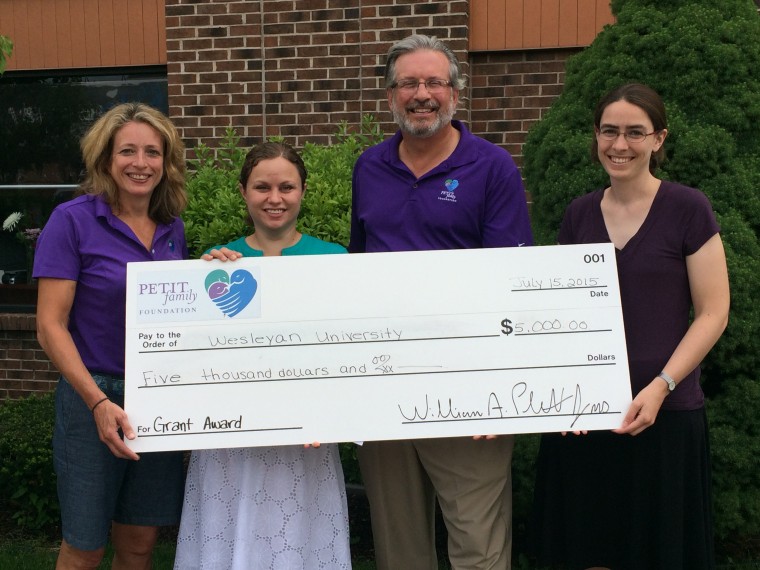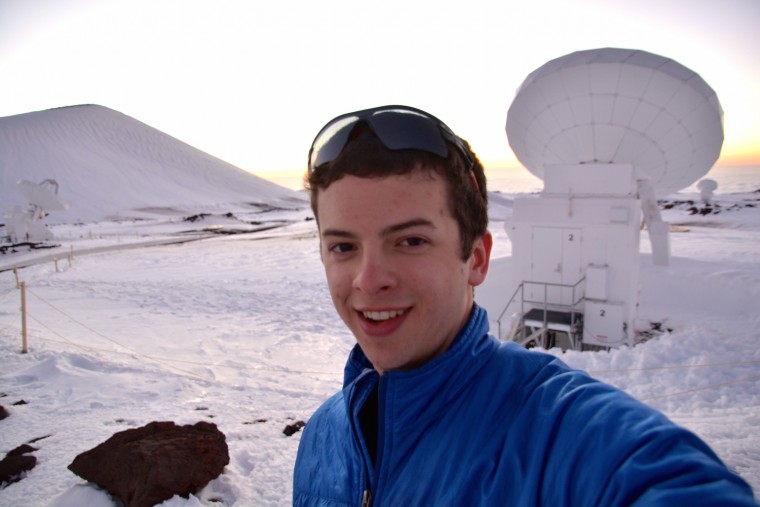Meredith Hughes, assistant professor of astronomy, assistant professor of integrative sciences, has been named a Cottrell Scholar for 2018 by the Research Corporation for Science Advancement (RCSA). Hughes is one of two dozen early career academic scientists to receive this honor, which comes with a $100,000 award for research and teaching. “The Cottrell Scholar (CS) program champions the very best early career teacher-scholars in chemistry, physics and astronomy by providing these significant discretionary awards,” said RCSA President and CEO Daniel Linzer. (more…)
Meredith Hughes, assistant professor of astronomy, is the co-author of "Debris Disks in the Scorpius-Centaurus OB Association Resolved by Alma," published in The Astrophysical Journal, Vo. 828, No. 1. Jesse Lieman-Sifry '15 also is a co-author of the article. In addition, the international weekly journal of science Nature mentioned the article in a Sept. 8 publication. The co-authors explored the idea of carbon-monoxide potentially being in large-star disks. As explained in her abstract, “Stars twice the size of the sun can feature carbon-monoxide-rich gas disks around them, contrary to the expectation that ultraviolet radiation would have stripped away the gas.” Hughes used the…
Kevin Flaherty, a postdoctoral researcher working with Meredith Hughes, assistant professor of astronomy, will speak on "Dusty Debris as a Window into New Planetary Systems" during the American Association for the Advancement of Science's (AAAS) 2016 Annual Meeting in Washington, D.C., Feb. 13. Flaherty is one of three symposium speakers who will discuss the theme "Planet Formation Seen with Radio Eyes." Scientists are now probing how, where, and when planets form and are analyzing the links between planetary system architecture and the properties of the parent circumstellar disk. Though the relationship of planetary to stellar masses remains obscure, it is clear that most…
For her outstanding contributions to Milky Way research by observational methods, Meredith Hughes, assistant professor of astronomy, received the 2015 Bok Prize in Astronomy from Harvard University. The prize, named in honor of Astronomer Bart Bok (1906–1983), is awarded to a recent holder of a PhD degree in the physical sciences from Harvard or Radcliffe who is under 35 years of age. Hughes received her PhD from Harvard in 2010, and a MA in astronomy from Harvard in 2007. Hughes is an expert on planet formation, circumstellar disk structure and dynamics, gas and dust disk evolution and radio astronomy. She studies planet formation by observing…
On July 15, the Petit Family Foundation awarded Wesleyan’s Physics Department with a $5,000 grant to support the 2016 Northeast Conference for Undergraduate Women in Physics (CUWiP). The three-day conference, scheduled for January 15-17, 2016, will showcase career opportunities available to physicists through plenary talks, panel discussions and a career fair. Attendees will have the opportunity to network and interact with more than 200 fellow undergraduate women physicists as well as a variety of industrial and academic leaders. Chris Othon, assistant professor of physics, and Meredith Hughes, assistant professor of astronomy, are co-organizing the conference with help from Nisha Grewal ’17 (physics/economics) and Julia…
#THISISWHY In this News @ Wesleyan story, we speak with Sam Factor '14, a graduate student in astronomy. Q: Sam, congratulations on completing your master’s thesis in astronomy! We understand you took your first astronomy class in the fall of your senior year at Wesleyan. What was your undergraduate major and how did your late-developing interest in astronomy come about? A: Thank you very much! As an undergrad, I majored in physics and computer science. During the fall of my senior year I took Introductory Astronomy (ASTR 155). I signed up for the course mainly because I wanted an interesting and relatively easy…
Assistant professor of Astronomy Meredith Hughes and eight colleagues have found evidence of magnetic fields in stardust – an indication that magnetic fields are important in the process of planetary system formation, according to a new paper in the journal Nature. The discovery is another step in work by Hughes and other astronomers to understand how celestial bodies are formed. It is known that magnetic fields in the “accretion disks” of stars play a dominant role in the star formation process. Using data from an observatory near Bishop, Calf., Hughes and her colleagues were able to spot signs of magnetic…
Meredith Hughes, assistant professor of astronomy, received a grant from the National Science Foundation to support her research on "Dust and Gas in Debris Disks Reveal the Origins of Planetary Systems." The grant, awarded on April 21, is worth $532,943. Hughes’ research focuses on understanding the formation and evolution of planetary systems. She particularly studies the huge disks of gas and dust surrounding a young star, which can give insight into how and when a star planet might form. The disk is made up of “junk” left over from the star’s formation. The main technique Hughes uses to observe these circumstellar…
Meredith Hughes, assistant professor of astronomy, is the co-author of a paper titled "Molecular Gas Clumps from the Destruction of Icy Bodies in the β Pictoris Debris Disk," published in the journal Science on March 6. Read more about Hughes study in this Wesleyan Connection article.
A curious mix of dust and gas surrounding a distant star presents a unique mystery – and possibly a front-row seat to planet formation, according to Assistant Professor of Astronomy Meredith Hughes and colleagues, whose paper on the star appears in the March 6 edition of the journal Science. The group of astronomers, including Hughes and 13 others, were the first to identify the asymmetry and “lumpy” quality of the gas surrounding beta Pictoris, using data from the Atacama Large Millimeter/Submillimeter Array (ALMA) in Chile. The discovery leads to two possible explanations: There may be a giant "exoplanet" lurking nearby…
(more…)
(Story contributed by Jim Smith) When graduate student Amy Steele settled into her seat the first day of an upper-level Radio Astronomy course last January she was anticipating a rigorous four-month exploration of the discipline. The instructor, Meredith Hughes, who had just joined the Astronomy Department as an assistant professor, came with strong credentials in radio astronomy. Steele was excited. After completing her undergraduate work at Williams College, she had taken four years off to work as the astronomy lab supervisor at the University of Texas at Arlington. Last fall she enrolled as a graduate student at Wesleyan. “Radio astronomy…





